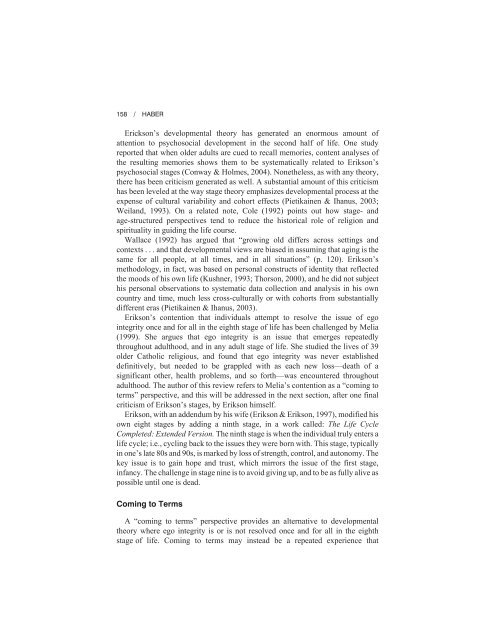life review: implementation, theory, research, and therapy - Wiki Home
life review: implementation, theory, research, and therapy - Wiki Home
life review: implementation, theory, research, and therapy - Wiki Home
You also want an ePaper? Increase the reach of your titles
YUMPU automatically turns print PDFs into web optimized ePapers that Google loves.
158 / HABER<br />
Erickson’s developmental <strong>theory</strong> has generated an enormous amount of<br />
attention to psychosocial development in the second half of <strong>life</strong>. One study<br />
reported that when older adults are cued to recall memories, content analyses of<br />
the resulting memories shows them to be systematically related to Erikson’s<br />
psychosocial stages (Conway & Holmes, 2004). Nonetheless, as with any <strong>theory</strong>,<br />
there has been criticism generated as well. A substantial amount of this criticism<br />
has been leveled at the way stage <strong>theory</strong> emphasizes developmental process at the<br />
expense of cultural variability <strong>and</strong> cohort effects (Pietikainen & Ihanus, 2003;<br />
Weil<strong>and</strong>, 1993). On a related note, Cole (1992) points out how stage- <strong>and</strong><br />
age-structured perspectives tend to reduce the historical role of religion <strong>and</strong><br />
spirituality in guiding the <strong>life</strong> course.<br />
Wallace (1992) has argued that “growing old differs across settings <strong>and</strong><br />
contexts...<strong>and</strong>that developmental views are biased in assuming that aging is the<br />
same for all people, at all times, <strong>and</strong> in all situations” (p. 120). Erikson’s<br />
methodology, in fact, was based on personal constructs of identity that reflected<br />
the moods of his own <strong>life</strong> (Kushner, 1993; Thorson, 2000), <strong>and</strong> he did not subject<br />
his personal observations to systematic data collection <strong>and</strong> analysis in his own<br />
country <strong>and</strong> time, much less cross-culturally or with cohorts from substantially<br />
different eras (Pietikainen & Ihanus, 2003).<br />
Erikson’s contention that individuals attempt to resolve the issue of ego<br />
integrity once <strong>and</strong> for all in the eighth stage of <strong>life</strong> has been challenged by Melia<br />
(1999). She argues that ego integrity is an issue that emerges repeatedly<br />
throughout adulthood, <strong>and</strong> in any adult stage of <strong>life</strong>. She studied the lives of 39<br />
older Catholic religious, <strong>and</strong> found that ego integrity was never established<br />
definitively, but needed to be grappled with as each new loss—death of a<br />
significant other, health problems, <strong>and</strong> so forth—was encountered throughout<br />
adulthood. The author of this <strong>review</strong> refers to Melia’s contention as a “coming to<br />
terms” perspective, <strong>and</strong> this will be addressed in the next section, after one final<br />
criticism of Erikson’s stages, by Erikson himself.<br />
Erikson, with an addendum by his wife (Erikson & Erikson, 1997), modified his<br />
own eight stages by adding a ninth stage, in a work called: The Life Cycle<br />
Completed: Extended Version. The ninth stage is when the individual truly enters a<br />
<strong>life</strong> cycle; i.e., cycling back to the issues they were born with. This stage, typically<br />
in one’s late 80s <strong>and</strong> 90s, is marked by loss of strength, control, <strong>and</strong> autonomy. The<br />
key issue is to gain hope <strong>and</strong> trust, which mirrors the issue of the first stage,<br />
infancy. The challenge in stage nine is to avoid giving up, <strong>and</strong> to be as fully alive as<br />
possible until one is dead.<br />
Coming to Terms<br />
A “coming to terms” perspective provides an alternative to developmental<br />
<strong>theory</strong> where ego integrity is or is not resolved once <strong>and</strong> for all in the eighth<br />
stage of <strong>life</strong>. Coming to terms may instead be a repeated experience that


